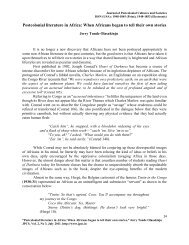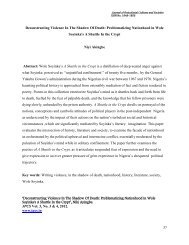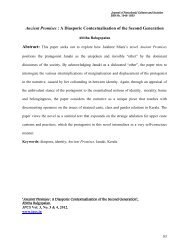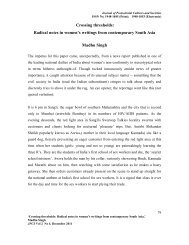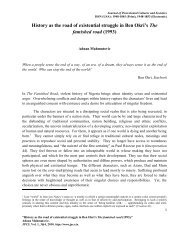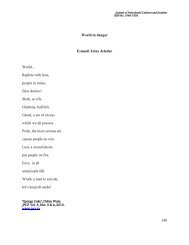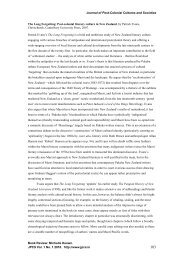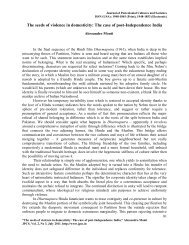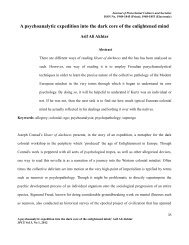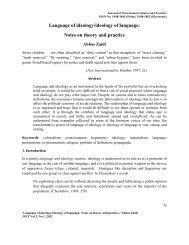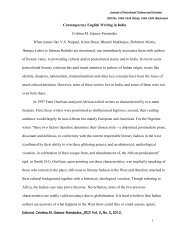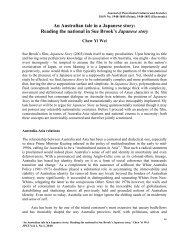Darwinist premise in the Orientalist construction of the âOtherâ - JPCS
Darwinist premise in the Orientalist construction of the âOtherâ - JPCS
Darwinist premise in the Orientalist construction of the âOtherâ - JPCS
You also want an ePaper? Increase the reach of your titles
YUMPU automatically turns print PDFs into web optimized ePapers that Google loves.
Journal <strong>of</strong> Postcolonial Cultures and Societies<br />
ISSN No. 1948-1845 (Pr<strong>in</strong>t); 1948-1853 (Electronic)<br />
expression by endur<strong>in</strong>g centuries <strong>of</strong> military and mental struggle, after which <strong>the</strong>y<br />
degenerated and that man must strive with Nature or with man, if he is not to fall back and<br />
degenerate. F. W. Headley's Darw<strong>in</strong>ism and Modern Socialism (1909) was an anti-socialist<br />
tract that used biological reason<strong>in</strong>gs to show that <strong>the</strong> cont<strong>in</strong>uance <strong>of</strong> competition and Natural<br />
Selection is essential to <strong>the</strong> well-be<strong>in</strong>g <strong>of</strong> a civilised community (Crook 63-97).<br />
The doctr<strong>in</strong>e <strong>of</strong> colonial discourses def<strong>in</strong>ed <strong>the</strong> goal <strong>of</strong> colonialism as enlighten<strong>in</strong>g and<br />
civiliz<strong>in</strong>g non-Western peoples. Yet, this idea was abandoned and replaced by a more racist<br />
doctr<strong>in</strong>e that colonized peoples were <strong>in</strong>telligently <strong>in</strong>ferior and were <strong>in</strong>capable <strong>of</strong> be<strong>in</strong>g<br />
civilized. The dark races were go<strong>in</strong>g to be ext<strong>in</strong>ct <strong>in</strong> <strong>the</strong> struggle for existence, and imperial<br />
exploitation needed no moral justification (Adas 318-42). Imperialist policies were regarded<br />
as ‘‘biological necessities’’ (Hawk<strong>in</strong>s 207 -09). The imperialist ideologies <strong>of</strong> <strong>the</strong> state<br />
supported by <strong>the</strong> <strong>in</strong>tellectual hegemony <strong>of</strong> Darw<strong>in</strong>ism were <strong>the</strong> dom<strong>in</strong>ant academic and<br />
<strong>in</strong>tellectual <strong>Orientalist</strong> agenda dur<strong>in</strong>g <strong>the</strong> colonial era. This is manifested <strong>in</strong> Muller’s 1892<br />
speech which began with a lengthy acknowledgment <strong>of</strong> royal patrons and governments for<br />
<strong>the</strong>ir protection and support <strong>of</strong> <strong>Orientalist</strong> scholarship (Muller 1–2), and ended with a frank<br />
admission that <strong>the</strong> ultimate end <strong>of</strong> Oriental studies was to serve imperialism:<br />
England has proved that she knows not only how to conquer, but how to rule. It is<br />
simply dazzl<strong>in</strong>g to th<strong>in</strong>k <strong>of</strong> <strong>the</strong> few thousands <strong>of</strong> Englishmen rul<strong>in</strong>g <strong>the</strong> millions <strong>of</strong><br />
human be<strong>in</strong>gs <strong>in</strong> India, <strong>in</strong> Africa, <strong>in</strong> America, and <strong>in</strong> Australasia. . . . Under <strong>the</strong><br />
personal patronage <strong>of</strong> H. R. H. <strong>the</strong> Pr<strong>in</strong>ce <strong>of</strong> Wales, a School <strong>of</strong> Modern Oriental<br />
Studies has at last been established at <strong>the</strong> Imperial Institute . . . [W]e want help, we<br />
want much larger funds . . . [F]ar higher <strong>in</strong>terests than <strong>the</strong> commercial supremacy <strong>of</strong><br />
England are at stake. (35–37)<br />
Scientists such as Konrad Lorenz and Ernst He<strong>in</strong>rich Haeckel built on <strong>the</strong> Darw<strong>in</strong>ian concept<br />
<strong>of</strong> ‘<strong>the</strong> survival <strong>of</strong> <strong>the</strong> fittest’, ma<strong>in</strong>ta<strong>in</strong><strong>in</strong>g that <strong>the</strong> same <strong>in</strong>exorable law applied to humanity.<br />
These <strong>the</strong>orists believed that <strong>the</strong>re existed two types <strong>of</strong> nations – those still vibrant and<br />
dest<strong>in</strong>ed to survive, and those that were old, stagnant and condemned to decl<strong>in</strong>e. However,<br />
<strong>the</strong> scientific-racist knowledge <strong>of</strong> <strong>the</strong> East created ano<strong>the</strong>r epistemological dichotomy which<br />
is a natural extension <strong>of</strong> <strong>the</strong> biologically determ<strong>in</strong>ed one. The ‘‘s<strong>of</strong>t version’’ <strong>of</strong> scientific<br />
racism and Weber’s conception <strong>of</strong> East-West differences that he saw <strong>the</strong> <strong>in</strong>feriority <strong>of</strong> <strong>the</strong><br />
East was culturally ra<strong>the</strong>r than biologically determ<strong>in</strong>ed is no less derogatory than a ‘‘hard<br />
version’’ <strong>of</strong> scientific racism or <strong>the</strong> evolutionary <strong>the</strong>ory <strong>of</strong> Herbert Spencer, who derived<br />
most <strong>of</strong> his data and ideas directly from <strong>the</strong> biological sciences <strong>of</strong> his day. It is worth<br />
mention<strong>in</strong>g here that Spencer’s biological imag<strong>in</strong>ation was <strong>in</strong>herited by many modernization<br />
<strong>the</strong>orists, who saw modernization follow<strong>in</strong>g <strong>the</strong> Western path as a universal, natural, and<br />
evolutionary process, and that social-scientific <strong>Orientalist</strong> <strong>in</strong>quiries today are still haunted by<br />
<strong>the</strong> essentialist conception <strong>of</strong> East-West differences and <strong>the</strong> unil<strong>in</strong>ear, evolutionary<br />
conception <strong>of</strong> social change. (Hung 273- 274)<br />
The Darw<strong>in</strong>ian <strong>Orientalist</strong> thought cont<strong>in</strong>ued to foster <strong>the</strong> racist <strong>in</strong>tellectual discourse <strong>in</strong> <strong>the</strong><br />
contemporary era. In his book The Wealth and Poverty <strong>of</strong> Nations (1998), David Lande’s<br />
‘<strong>Darw<strong>in</strong>ist</strong> <strong>premise</strong> <strong>in</strong> <strong>the</strong> <strong>Orientalist</strong> <strong>construction</strong> <strong>of</strong> <strong>the</strong> “O<strong>the</strong>r”,’ Mohamed Hamoud Kassim Al-<br />
Mahfedi and Venkatesh P<br />
<strong>JPCS</strong> Vol 3, No 1, 2012<br />
9



